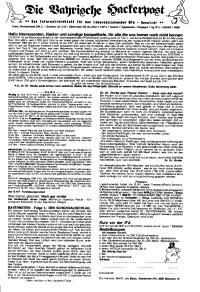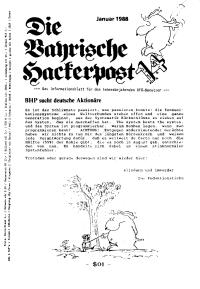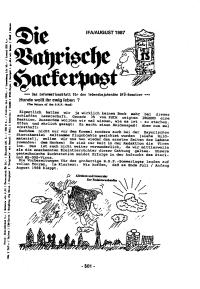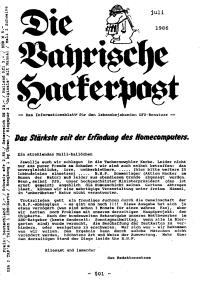Copy Link
Add to Bookmark
Report
Netizens-Digest Volume 1 Number 228

Netizens-Digest Tuesday, December 15 1998 Volume 01 : Number 228
Netizens Association Discussion List Digest
In this issue:
Re: [netz] Voltaire's Bastards (was: THOUGHTS ON THE NEW COMMUNICATION TECH
[netz] Indranet (was:
[netz] Re: Voltaire's Bastards
----------------------------------------------------------------------
Date: 15 Dec 1998 01:56:07 +0100
From: Carsten Laekamp <lakamp@capway.com>
Subject: Re: [netz] Voltaire's Bastards (was: THOUGHTS ON THE NEW COMMUNICATION TECH
kerryo@ns.sympatico.ca (Kerry Miller) writes:
Interesting, but this calls for a few comments:
> ...And so the breakdown of public figures over the last century has
> resolved itself into a large group on the rational side --
> technocrats, Heroes and false Heroes -- with, on the other, a small
> group that resists the structural imperatives and stands for an
> embattled humanist tradition...
I guess you will call that last group the "new heroes" :-)
> p. 27-30 [In the case of government,] there has been a gradual
> widespread improvement in social standards, thanks in good part to the
> work of large bureaucracies. But the conversion of the political class
> into an extension of the technocracy has been a disaster.
(See below)
> Efficient
> decision making, after all, is a characteristic proper to
> authoritarian governments. Napoleon was efficient. Hitler was
> efficient. Efficient democracy is democracy castrated....
Sounds as if the author is opposing efficiency and democracy. This
cannot be accepted. Yes, aiming at the best efficiency will lead away
from democracy. OTOH a democracy that is too inefficient won't last
either, because it will call for something radically more
efficient. This is exactly how Napoleon managed to keep the power,
after his coup.
Manicheism won't ever help anything. The problem is, as always, a
question of balance more than anything else.
> It follows that the theology of power, under which the technocracy
> prospers, marginalizes the whole idea of opposition and therefore that
> of sensible change. Opposition becomes a refusal to participate in the
> process. It is irrational. And this trivialization of those who
> criticize or say no from outside the power structure applies not only
> to politics but to all organizations.
A good observation but only for cultures which rely on consensus
rather than on alternatives. This is true for e.g. the US but not for
most of Europe, where the lack of opposition between moderated
groups automatically gives more importance to extremists. This has
well been demonstrated during the past 15 years.
> But the nature of power has completely changed in our society. There
> has been a marriage between the state and the means of production, an
> integration of the elites into an interchangeable technocracy,
yes
>a
> confusion over ownership and management in the corporations.
No ! The dilution of ownership (and thus the power of the
management)is *inherent* to the notion of corporations, and the more
the bigger they are. Of course, every time the stock market gets more
important, this phenomenon is amplified, the emplyee or customer being
also an owner. But this is not a constant but rather a cyclic
evolution. And it cannot be blamed on reason, but on greed (the search
for immediate profit through speculation). And it is very
short-sighted, as the 1929 crash has shown.
If you look closer at the structures, you will also see that mutual
ownership of corporations finally gives the real power to a very small
number of people (and that's the real *structural* problem). Among
these, you will find as many (or even more) owners as managers.
>These
> structures make it almost impossible for the law to judge illegal that
> which is wrong.
Hmmm... why ?
> ...[The] breakdown of social order -- rules of dress, sexual controls,
> speech patterns, family structure -- has been seen as a great victory
> for the individual. [But] these acts of personal freedom are
> irrelevant to the exercise of power. So in lieu if taking a real part
> in the evolution of society, the individual struggles to appear as if
> no one has power over his personal evolution. Thus victories won for
> these individual liberties may actually be an acceptance of defeat by
> the individual.
Nothing to worry about, then, with today's re-emergence of
conventionalism :)
> For example, never have so few people been willing to speak out on
> important questions. Their fear is not tied to physical threats but to
> standing apart from their fellow experts or risking a career or
> entering an area of nonexpertise. Not since the etiquette-ridden
> courts of the 18c has public debate been so locked into fixed
> positions, fixed formulas and fixed elites ...
This seems, at least to me, to be just another sign of the new
Victorianism that's coming. *All* behaviour is getting more and more
standardised again. The 70's are definitely out :)
> Finally, our imagination has been radically altered in two areas by
> the Age of Reason. The image, which was first scratched on stone
> walls, then painted, printed, photographed and projected, can now be
> conceived as a three- dimensional whole by a computer program. In
> other words, after thousands of years of progress, the image has
> achieved technical perfection. That progress has been central to our
> sense of our own immortality and the completion of it has had a
> profoundly destabilizing effect on our sense of what we are.
Stated this way, this just sounds like a lot of crap. But maybe there is
an explanation somewhere else in the text ?
> On top
> of that, the undermining of universal language, in large part by the
> dialects of expertise, has meant that we cant turn to the word to
> steady ourselves.
There never has been a "universal" language and there have always been
dialects of expertise. The appearance of dialects of *ideology* and the
greater importance of experts in society are the real problems.
> Instead, the writers and their pens, having invented
> the Age of Reason, are now its primary prisoners and so are unable to
> ask the right questions, let alone break down the imprisoning
> linguistic walls of their own creation.
Yes. Still, in a non-consensual society, the writers using a
non-dominant ideology's dialect might ask the right questions
(unfortunately, they also often provide the wrong answers) and are
heard by a large part of the society. The problem then becomes more
one of inter-communication between different parts of the general
population than between the "leaders" and the others (exactly what
fascist or communist parties, as well as sects, aim at). And that is
the defeat of Reason.
>
> p 39 The [manager or] technocrat began his existence as the ideal
> servant of the people -- a man freed from both irrational ambition and
> self-interest.
I cannot see how this applies to managers...
> Then, with surprising rapidity, he evolved into one who
> used the system with a distant contempt for the people.
And this has been so much longer before the age of Reason.
>
> Trapped between these technocrats and Heroes were the reasonable
> men... -- men who held firmly to their common sense morality.
And common sense is very dangerous, because it very often is mistaken
for logics or reason. And I don't understand how "reasonable men" can
be opposed to men of "Reason".
> But they
> were neither efficient enough nor exciting enough to hold their own
> [although] many did, for a period of time -- Pascal Paoli for twenty
> years in Corsica, Jefferson for even longer in the new United States,
> the first Pitt for several decades in England...
Yes, Jefferson was a man of common sense... and this led him to say
very stupid things as well as very clever ones.
> That main line has been obscured by two of our obsessions. One is an
> uncontrollable urge to give ourselves the impression that we have made
> yet another fresh start. We are constantly declaring new ages...
Yep.... since 1917 !
> This tells us a great deal about our other obscuring obsession. We
> have great difficulty dealing with philosophy in the context of real
> events. These two categories seem to live on separate planets.
Philosophy has never had any big influence of everyone's "real" life.
> For
> example, we are still convinced that violence is the product of fear
> and dear the product of ignorance.
Who is "we" ? Fear is *one* possible cause for violence, as ignorance
is *one* possible reason for fear:
The RC Church has kept most people in Europe obedient with
ignorance and fear for centuries !
Scientific knowledge, OTOH, can only increase the fear of the use
others could make of that knowledge...
> And yet, since the beginning of the
> Age of Reason, there has been a parallel growth in both knowledge and
> violence, culminating in the slaughters of the 20th century.
What knowledge ? The ignorance that leads to fear and then to violence
is the ignorance about one's neighbours. In that respect, we haven't
learnt a lot since the Renaissance !
- --
Carsten Läkamp
claekamp@mindless.com
------------------------------
Date: Tue, 15 Dec 1998 11:22:47 -0400
From: kerryo@ns.sympatico.ca (Kerry Miller)
Subject: [netz] Indranet (was:
Dr Louis Arnoux wrote:
{ Our work is aimed at facilitating the development of an =
{ alternative mode of telecommunication and networking using computerised =
{ wireless high bandwidth mesh networks. Whe fully developed our system =
{ will be extremely low cost relative to present telecom costs. One of our =
{ objectives is to give people a means of developing independent telecom =
{ networks, and to contribute to the development of communities in =
{ "cyberspace".
I dont know about NZ but the key concept is known in the US as LMDS:
http://www.idg.net/idg_frames/english/content.cgi?vc=docid_0-77528.html
FCC launches LMDS wireless license auction
By Marc Ferranti
InfoWorld Electric
Posted at 7:03 AM PT, Feb 19, 1998
The U.S. Federal Communications Commission on Wednesday launched
its auction for Local Multipoint Distribution Service (LMDS) licenses,
paving the way for wireless services to offer voice, video, and data
transmission services of up to 1gigabit per second.
The licenses can be used to provide television broadcasts, Internet access,
and toll-quality voice services, according to the FCC.
The auction should jump-start use of LMDS around the country. In the
first round of bidding, held Wednesday, the FCC received 844 bids
amounting to $322.5 million for markets around the United States,
according to the FCC.
WNP Communications, backed by venture capital companies, put the
most money on the table, offering up $135.7 million and garnering top bids
in various markets that cover a population of 110 million people,
according to the FCC.
Another big bidder was U.S. West, a regional Bell telephone company,
which scored top bids in markets covering a population of 35 million
people. The total value of U.S. West's bids was $35 million.
But the top bids of Wednesday may be surpassed by bids for the same
licenses in other rounds.
The wireless spectrum auction process has been touched by controversy,
mainly because the previous "C-block" wireless licenses, used for personal
communications systems (PCS), has turned into a legal and financial
nightmare for the FCC.
The C-block licenses were reserved for small, competitive companies that
wanted to get into the PCS market. As such, payment for the licenses was
allowed on installment. Spurred by easy credit, many companies overbid
and later found out they couldn't borrow the money to pay for the licenses.
Now, after several C-block bidders have gone bankrupt, and with the
FCC having to scramble to help the remaining solvent companies keep
their payment commitments, the LMDS bidding is happening under
different rules.
For one thing, bidders have to pay up the full value of the bid before they
can operate their licenses, an FCC spokeswoman said. The idea is to
keep the bids close to what the bidders can afford or are able to borrow.
This way, the FCC hopes to keep the LMDS market from getting mired
down in legal and financial entanglements.
LMDS stands a chance of competing with land-line data and voice
communications because it offers high capacity with lower prices. Exactly
how much lower will depend, in part, on how high the bidding process
drives up the cost of licenses.
The FCC will continue to hold further rounds of bidding until the bidding
action winds down, according to the FCC spokeswoman. Then it will stop
the bidding, tally up the bids, and announce the winners of licenses in
markets around the country.
The FCC is not sure how many rounds it will take to ensure it has tapped
out the market for the bids. Bids for other parts of the wireless spectrum
have taken months, according to the FCC.
More information on the FCC and the LMDS auction can be found at
http://www.fcc.gov/.
------------------------------
Date: Tue, 15 Dec 1998 11:22:48 -0400
From: kerryo@ns.sympatico.ca (Kerry Miller)
Subject: [netz] Re: Voltaire's Bastards
Carsten Laekamp wrote:
{ > ... on the other, a small
{ > group that resists the structural imperatives and stands for an
{ > embattled humanist tradition...
{
{ I guess you will call that last group the "new heroes" :-)
{
The 'media' would call them heroes, because in their usage, its any underdog
that comes to their attention. Ralston Saul uses his language pretty carefully,
and for him the Hero is 'brought foward' by *public demand* (not to mention the
'opinion leaders') -- and the humanists are not in the running. Martyrs might
be a better title, but titles of course are not a humanist thing...
{ Sounds as if the author is opposing efficiency and democracy. This
{ cannot be accepted. Yes, aiming at the best efficiency will lead away
{ from democracy. OTOH a democracy that is too inefficient won't last
{ either, because it will call for something radically more
{ efficient. This is exactly how Napoleon managed to keep the power,
{ after his coup.
{
{ Manicheism won't ever help anything. The problem is, as always, a
{ question of balance more than anything else.
{
I think you can have a pair of opposed concepts without necessarily
excluding the middle ground. Of course a democracy will get things done; the
question is whether 'argument, in "marginalizing the whole idea of opposition")
{ > Opposition becomes a refusal to participate in the
{ > process. It is irrational. And this trivialization of those who
{ > criticize or say no from outside the power structure applies not only
{ > to politics but to all organizations.
{
{ A good observation but only for cultures which rely on consensus
{ rather than on alternatives. This is true for e.g. the US but not for
{ most of Europe, where the lack of opposition between moderated
{ groups automatically gives more importance to extremists. This has
{ well been demonstrated during the past 15 years.
{
You knew he was Canadian (the land of the moderates)?
{ >a
{ > confusion over ownership and management in the corporations.
{
{ it cannot be blamed on reason, but on greed (the search
{ for immediate profit through speculation). And it is very
{ short-sighted, as the 1929 crash has shown.
You argue well - for JRS! Rationalism *is* short sighted.
{ If you look closer at the structures, you will also see that mutual
{ ownership of corporations finally gives the real power to a very small
{ number of people (and that's the real *structural* problem). Among
{ these, you will find as many (or even more) owners as managers.
{
I'm not sure we (the three of us ;-) are using the terms the same way.
Does 'mutual ownership' mean stockholders? Or linked boards?
{ >These
{ > structures make it almost impossible for the law to judge illegal that
{ > which is wrong.
{
{ Hmmm... why ?
'Wrongness' is a moral ('reasonable') concept; 'illegal' is a legal
(rational) one.
(Speaking for myself ;-) thats why the impeachment hearings are such a tragi-
comedy: the House of Reps is trying to hang Clinton on an essentially *moral*
issue, as if somewhere they enacted legislation defining US morality...
{ > For example, never have so few people been willing to speak out on
{ > important questions. Their fear is not tied to physical threats but to
{ > standing apart from their fellow experts or risking a career or
{ > entering an area of nonexpertise. Not since the etiquette-ridden
{ > courts of the 18c has public debate been so locked into fixed
{ > positions, fixed formulas and fixed elites ...
{
{ This seems, at least to me, to be just another sign of the new
{ Victorianism that's coming. *All* behaviour is getting more and more
{ standardised again. The 70's are definitely out :)
{
You make a general observation ('just another sign') in reply to JRS'
specific hypothesis (' in lieu if taking a real part in the evolution of
society'), but I don't see any disagreeemnt. Imo, not questioning the nature of
power remains a profound symptom of *something*.
{ >That progress has been central to our
{ > sense of our own immortality and the completion of it has had a
{ > profoundly destabilizing effect on our sense of what we are.
{
{ Stated this way, this just sounds like a lot of crap. But maybe there is
{ an explanation somewhere else in the text ?
{
I think so. I've only just begun the book, but he does like to come back to
the same ideas.
{ > On top
{ > of that, the undermining of universal language, in large part by the
{ > dialects of expertise, has meant that we cant turn to the word to
{ > steady ourselves.
{
{ There never has been a "universal" language and there have always been
{ dialects of expertise. The appearance of dialects of *ideology* and the
{ greater importance of experts in society are the real problems.
{
I think he means *relative to the community* - yes, up to a point, the
gentry might use one 'language' and the hoi polloi another, but they could
understand one another. Now we are hard pressed to define community in any way
but the purely physical property of juxtaposition. (He speaks to this in an
interview, and some scraps of _The Doubter's Dictionary_ that Ive posted at
www3.ns.sympatico.ca/kerryo/london.htm and
www3.ns.sympatico.ca/kerryo/saul-d.htm )
{ > Instead, the writers and their pens, having invented
{ > the Age of Reason, are now its primary prisoners and so are unable to
{ > ask the right questions, let alone break down the imprisoning
{ > linguistic walls of their own creation.
{
{ Yes. Still, in a non-consensual society, the writers using a
{ non-dominant ideology's dialect might ask the right questions
{ (unfortunately, they also often provide the wrong answers) and are
{ heard by a large part of the society. The problem then becomes more
{ one of inter-communication between different parts of the general
{ population than between the "leaders" and the others (exactly what
{ fascist or communist parties, as well as sects, aim at). And that is
{ the defeat of Reason.
{
I'll leave you to argue this one with the author ;-)
{ >
{ > p 39 The [manager or] technocrat began his existence as the ideal
{ > servant of the people -- a man freed from both irrational ambition and
{ > self-interest.
{
{ I cannot see how this applies to managers...
{
{ > Then, with surprising rapidity, he evolved into one who
{ > used the system with a distant contempt for the people.
{ And common sense is very dangerous, because it very often is mistaken
{ for logics or reason. And I don't understand how "reasonable men" can
{ be opposed to men of "Reason".
Surely you jest! If you trim your rosebush 'reasonably,' do you do it on
strictly rational lines? (Start at the top, you know, so as you tire you'll be
able to move lower and lower, and not have to lift the pruners so much ;-))
{ Yes, Jefferson was a man of common sense... and this led him to say
{ very stupid things as well as very clever ones.
{
Neither reasonableness or Reason predicts either stupidity or cleverness,
does it?
{ Philosophy has never had any big influence of everyone's "real" life.
The entire pattern of schooling was overhauled by
pedagogy -- the philosophy of education -- just around 1917, as it happened...
I would guess that has had a big influence on everybody on this list, at any
rate (I dunno about Usenet ;-)
{ > And yet, since the beginning of the
{ > Age of Reason, there has been a parallel growth in both knowledge and
{ > violence, culminating in the slaughters of the 20th century.
{
{ What knowledge ? The ignorance that leads to fear and then to violence
{ is the ignorance about one's neighbours. In that respect, we haven't
{ learnt a lot since the Renaissance !
{
Exactly, what knowledge? We not only dont learn anyhting about our
neighbors, but we 'invent 'social mobility' to make it almost impossible to
learn anything about them, either -- that is, this doesnt even count as
knowledge, compared to technological gimmicks of one sort and antoher..
{ Scientific knowledge, OTOH, can only increase the fear of the use
{ others could make of that knowledge...
Shouldn't we have to distinguish between *how the scientist thinks* and how the
public thinks of science? 'Sc knowledge' doesnt increase the *scientist's*
fear, does it? And its been known for years that the public understanding of
'science' is dismal (being fixated on _results_ (that is, really technology)
rather than the method of scientific skepticism) -- so we could say its public
ignorance of science itself that makes 'us' fearful.
kerry, praying for rain
------------------------------
End of Netizens-Digest V1 #228
******************************




























